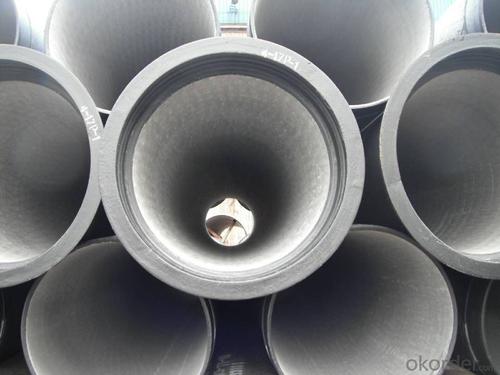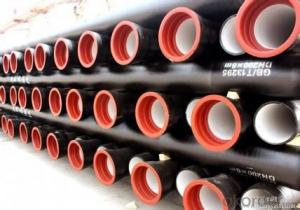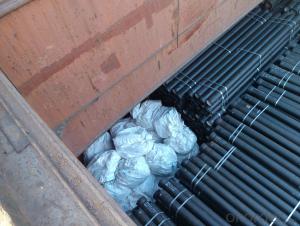DUCTILE IRON PIPE DN200 K8/C
- Loading Port:
- China Main Port
- Payment Terms:
- TT OR LC
- Min Order Qty:
- -
- Supply Capability:
- -
OKorder Service Pledge
OKorder Financial Service
You Might Also Like
Specification:
1) The standard of pipe: ISO2531:1998, K9
2) Effective length: 6m
3) Inner cement line: Portland cement line as per ISO4179
4) Zinc coating: at least 130g/m2 as per ISO8179
5) Bitumen painting: at least 70um as per ISO8179
6) With 100% quantity of NBR ring, or SBR ring, or EPDM ring as per ISO4633
7) DN80mm-800mm
8) High strength, lighter than grey iron, good corrosion resistance, no furring, small flow resistance, easy fixing, long life tome about 100 yeas
9) Produced by Hangzhou chunfeng machine
10) Checked by automatic inspection equipment
11) Composition:
Chemical composition | |||
Chemical composition | Ductile Cast Iron Pipe (%) | Grey iron pipe (%) | Steel pipe (%) |
C | 3.5-4.0 | 3.2-3.8 | 0.1-0.2 |
Si | 1.9-2.6 | 1.4-2.2 | 0.15-0.4 |
Mn | 0.15-0.45 | 0.4-0.6 | 0.3-0.6 |
P | ≤0.06 | ≤0.3 | 0.02-0.03 |
S | ≤0.02 | ≤0.1 | 0.02-0.03 |
Mg | 0.03-0.06 |
|
|
12) Feature:
Mechanical properties | |||
| Ductile Cast Iron Pipe | Grey Iron Pipe | Steel Pipe |
Tensile Strength(Mpa) | ≥420 | 150-260 | ≥400 |
Yield Strength(Mpa) | ≥300 | No Confirmation | No Confirmation |
Bending Strength(Mpa) | ≥590 | 200-360 | ≥400 |
Elongation (%) | ≥10 | Neglected | ≥18 |
Brinell Hardness(HBS) | ≤230 | ≤230 | About 140 |
13) T type mechanical joint
14) Packing: in bulk or container
- Q: How does ductile iron pipe perform in high-temperature environments?
- Ductile iron pipe performs well in high-temperature environments due to its superior strength and thermal resistance. It can withstand elevated temperatures without significant deformation or structural damage, making it a reliable choice for various applications requiring high-temperature resistance.
- Q: Are ductile iron pipes resistant to alkali attacks?
- Ductile iron pipes have been proven to be highly resistant to alkali attacks. The material used in ductile iron pipes, known as ductile cast iron, is formulated with specific chemical compositions that provide exceptional corrosion resistance. This resistance extends to alkali attacks, which are chemical reactions that occur when alkaline substances come into contact with metals or other materials. Ductile iron pipes have a dense and protective oxide film on their inner and outer surfaces, which acts as a barrier against chemical attacks. This oxide film forms naturally over time, and its composition and structure provide excellent resistance to alkali attacks. Additionally, ductile iron pipes are often coated with various protective layers, such as epoxy or zinc, to further enhance their resistance to corrosion and chemical reactions. It is important to note that while ductile iron pipes are highly resistant to alkali attacks, the severity and concentration of the alkali substances can still impact their overall performance. In extreme cases, very high concentrations of alkali substances or prolonged exposure to aggressive alkaline environments may eventually cause some damage to the protective layers of the pipes. However, under normal conditions and within acceptable parameters, ductile iron pipes are considered to have excellent resistance to alkali attacks.
- Q: Are ductile iron pipes suitable for underground storage tanks?
- Underground storage tanks can indeed benefit from the use of ductile iron pipes. Ductile iron, known for its strength and durability, exhibits exceptional resistance to corrosion and can withstand the immense pressure and weight associated with burial underground. These pipes find widespread application in various underground systems, such as water and sewage systems, owing to their remarkable tensile strength and ability to handle both internal and external loads. Furthermore, ductile iron pipes boast an extended service life, often surpassing 100 years, rendering them a dependable choice for underground storage tanks. They also possess resistance against ground movement and can adapt to soil settling or shifting, thereby ensuring the integrity and stability of the storage tank system. Moreover, the smooth internal surface of ductile iron pipes provides excellent flow characteristics, preventing the accumulation of debris or sediment that may impede the system. Hence, they prove to be an ideal option for storing a diverse range of liquids or substances. In conclusion, the strength, durability, corrosion resistance, and long service life of ductile iron pipes establish them as a suitable and reliable choice for underground storage tanks.
- Q: What are the different types of fittings available for ductile iron pipe?
- Ductile iron pipe offers a variety of fittings to accommodate different plumbing or piping systems. These fittings come in various configurations to connect, redirect, or branch off the pipe. One frequently used fitting is the flanged fitting, which has a flange or lip on one end for easy bolted connection to another flanged component. Flanged fittings are ideal for applications requiring a tight seal, such as water or sewage systems. Another option is the mechanical joint fitting, which utilizes a gasket and mechanical bolts to securely connect two pipe pieces. This type of fitting is often employed in underground water or sewer systems. Push-on fittings are also popular for ductile iron pipe. These fittings have a rubber gasket that is compressed onto the pipe, ensuring a watertight seal. They are quick and easy to install, making them perfect for applications where speed and efficiency are crucial. When a change in direction is necessary, ductile iron pipe fittings like elbows or bends are utilized. These fittings smoothly alter the pipe's direction without causing significant flow restrictions. Furthermore, saddle fittings are available for ductile iron pipe. These fittings create a branch connection on an existing pipeline without the need for cutting or welding. They are commonly used in irrigation or fire protection systems. In conclusion, the range of fittings for ductile iron pipe provides options to meet the specific requirements of different plumbing or piping systems. Whether it's flanged fittings for a tight seal, mechanical joint fittings for underground applications, push-on fittings for quick installation, or specialized fittings like elbows or saddle fittings, each type serves a specific purpose within the overall plumbing or piping system.
- Q: What is the K9 standard pressure for ductile iron pipes?
- The annealed ductile iron pipe is composed of ferrite and pearlite. The mechanical properties of the ductile iron pipe are better. Ductile iron pipes mainly called centrifugal ductile iron pipe, it has the properties of nature, iron and steel, excellent corrosion resistance, good ductility, good sealing effect, simple installation, mainly for municipal, industrial and mining enterprises, water supply, gas, oil etc.. Water supply pipe is the first choice, with high cost performance. Compared with the PE pipe, from the installation time, ductile pipe PE pipe installation is simple and rapid, and after the installation of internal and external pressure bearing better tightness and corrosion resistance; from the point of view, ductile pipe sealing better after installation, but also can improve the corrosion resistance of corrosion protection through a variety of means; from the hydraulic performance, because ductile pipe specifications generally refers to the inner diameter of PE pipe diameter specifications generally refers to the same specifications, because under the condition of ductile pipe can achieve greater runoff; from the installation and maintenance cost, ductile pipe have more favorable price. The main components of ductile iron pipes are carbon, silicon, manganese, sulfur, phosphorus and magnesium. The inner wall of zinc spray, anti-corrosion materials such as cement mortar.
- Q: What are the typical bedding and backfill requirements for ductile iron pipes?
- The typical bedding and backfill requirements for ductile iron pipes are important to ensure the proper installation and long-term performance of the pipes. Generally, the bedding material should be a granular material that provides support and uniform load distribution to the pipe. This can include materials such as sand, gravel, or crushed stone. The bedding material should be placed in a continuous and uniform layer along the bottom of the trench, with a minimum thickness of 6 inches. The width of the bedding layer should be at least 1.5 times the outside diameter of the pipe, or as specified by the pipe manufacturer. Backfill material is used to fill the remaining space around the pipe after the bedding is in place. The backfill material should also be a granular material, free from large stones, debris, or organic matter. It should be compacted in layers around the pipe, typically in 6-inch increments, using appropriate compaction equipment. The backfill should be placed evenly around the pipe, ensuring that there are no voids or gaps. It is important to avoid excessive compaction that could lead to damage or deformation of the pipe. The backfill material should extend above the top of the pipe to provide a minimum of 12 inches of cover. In addition to the bedding and backfill requirements, it is essential to follow any specific guidelines provided by the pipe manufacturer. These guidelines may include recommendations for specific materials, compaction methods, or additional protective measures. Overall, the proper bedding and backfilling of ductile iron pipes is crucial for maintaining the structural integrity and preventing damage or failure of the pipe system. Adhering to industry standards and manufacturer specifications ensures the longevity and performance of the pipes in various applications.
- Q: There are several forms of flexible interfaces for Spigot Cast Iron Pipes
- Socket type cast iron pipe rigid interface antiallergic can, under the action of external force, no tower water supply equipment interface packing easy fragmentation and leakage, especially in the weak foundation and uneven subsidence area and the earthquake zone. The interface damage rate is higher. Therefore, flexible interfaces should be adopted under the above unfavorable conditions.
- Q: Can ductile iron pipes be used for stormwater management?
- Yes, ductile iron pipes can be used for stormwater management. Ductile iron is a strong and durable material that is resistant to corrosion and can withstand the high flow rates and pressures typically associated with stormwater management systems. These pipes have been widely used for various applications, including stormwater drainage and sewage systems. Their ability to handle heavy loads and withstand environmental factors makes them a suitable choice for stormwater management, ensuring efficient water flow and preventing flooding in urban areas. Moreover, ductile iron pipes have a long lifespan, reducing the need for frequent maintenance and replacement, making them a cost-effective choice for stormwater management infrastructure.
- Q: Can ductile iron pipe be used for cooling water systems?
- Yes, ductile iron pipe can be used for cooling water systems. Ductile iron pipe has excellent corrosion resistance, high tensile strength, and is capable of withstanding high-pressure conditions, making it suitable for various applications, including cooling water systems. Its durable and versatile nature allows it to effectively transport and distribute cooling water without the risk of leakage or failure. Additionally, ductile iron pipe is known for its long service life and low maintenance requirements, making it a cost-effective choice for cooling water systems.
- Q: What is the expected joint performance of ductile iron pipes?
- Ductile iron pipes are widely recognized for their outstanding joint performance. They possess exceptional durability and strength, making them suitable for a wide range of applications, including water distribution, sewer systems, and industrial pipelines. One crucial aspect of joint performance in ductile iron pipes is their ability to withstand external loads and pressure. To ensure minimal leakage and long-term structural integrity, the joints in these pipes are designed to create a tight and secure connection. This is accomplished through the utilization of various joint types, such as push-on joints, mechanical joints, and restrained joints. Push-on joints are commonly employed in ductile iron pipes due to their ease of installation. They do not require any specialized tools or equipment. These joints rely on a rubber gasket, which guarantees a watertight seal and prevents leakage. On the other hand, mechanical joints involve the use of mechanical devices, such as bolts and nuts, to establish a rigid connection between the pipes. This type of joint provides additional strength and resistance against external forces. Ductile iron pipes have undergone extensive testing to ensure their performance meets or exceeds industry standards for pressure and bending strength. They exhibit high resistance to corrosion, resulting in a longer service life. Additionally, they are less susceptible to damage caused by ground movements or vibrations. These properties contribute to the overall joint performance of ductile iron pipes, ensuring reliable and efficient operation in various infrastructure systems. When properly installed and maintained, ductile iron pipes display remarkable joint performance. They provide a reliable and durable solution for numerous applications within the water and wastewater industry.
Send your message to us
DUCTILE IRON PIPE DN200 K8/C
- Loading Port:
- China Main Port
- Payment Terms:
- TT OR LC
- Min Order Qty:
- -
- Supply Capability:
- -
OKorder Service Pledge
OKorder Financial Service
Similar products
Hot products
Hot Searches
Related keywords


























